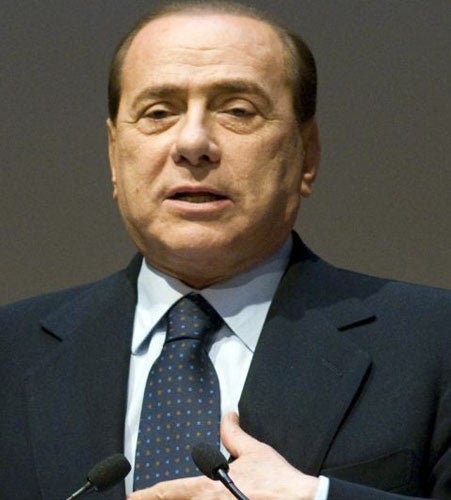Murdoch is waging a vendetta against me, says Berlusconi
Italian PM accuses rival media mogul of ordering negative stories about him

Your support helps us to tell the story
From reproductive rights to climate change to Big Tech, The Independent is on the ground when the story is developing. Whether it's investigating the financials of Elon Musk's pro-Trump PAC or producing our latest documentary, 'The A Word', which shines a light on the American women fighting for reproductive rights, we know how important it is to parse out the facts from the messaging.
At such a critical moment in US history, we need reporters on the ground. Your donation allows us to keep sending journalists to speak to both sides of the story.
The Independent is trusted by Americans across the entire political spectrum. And unlike many other quality news outlets, we choose not to lock Americans out of our reporting and analysis with paywalls. We believe quality journalism should be available to everyone, paid for by those who can afford it.
Your support makes all the difference.The worst-kept secret in Italy is finally out in the open: the long and profitable friendship between the two media moguls who bestride the land, Silvio Berlusconi and Rupert Murdoch, is dead and buried.
Mr Berlusconi himself spilled the beans yesterday. "I don't want to be nasty," he said on one of the three private television channels he owns through his company Mediaset, "but the episode of VAT on Sky created a rift with Sky and Murdoch which has been followed by a series of highly critical articles about me."
The "episode" was the decision by Mr Berlusconi's government in December 2008 to double the rate of VAT on satellite television to 20 per cent.
As Mr Murdoch's Sky Italia for years enjoyed an effective satellite monopoly in Italy, a comfortable position achieved with help from Mr Berlusconi, the jump in the tax rate was seen at Sky as a calculated attack.
In an angry statement released at the time, Tom Mockridge, the chief executive of Sky Italia, pointed out that the increase affected Italian families facing "difficult times", landing them with an average subscription increase of €50 (£44) per year per subscriber, but it also contradicted a government promise to help make businesses grow.
Mr Murdoch was so furious about the tax increase during a recession, which he saw as a direct assault on his business, that he took the unusual step of appearing in person at the Sky Italia headquarters to denounce it.
He went on the offensive, ordering advertising spots on Sky channels lambasting the Berlusconi government and firing off letters to MPs, denouncing the tax rise.
Less subtle measures followed. During the Easter break, Sky Italia broadcast the film Shooting Silvio, which depicts a man's plan to rid Italy of Mr Berlusconi with a bullet.
Angry members of Mr Berlusconi's ruling PdL (People of Freedom) party said the film was "an incitement to violence" against the Prime Minister. It certainly wasn't put on to boost ratings: critics have noted the ponderous film by Berado Carboni is more like an incitement to doze off.
Sky Italia followed up by poaching Mediaset's ratings-topping showman Rosario Fiorello. Mr Berlusconi was so unhappy about Fiorello going to "the enemy", as he reportedly put it, that he summoned the star to his Rome home in an attempt to dissuade him. But his charm offensive failed. It was the end of a beautiful friendship. In the late 1990s, Mr Berlusconi smoothed the way for Mr Murdoch to enter the Italian television market by allowing him to purchase Stream from Telecom Italia. There was talk of their meeting on their gigantic yachts, of lunchtime tête-à-têtes in the Italian's Sardinian villa.
Today, people in both camps speak of them being virtually at war. "It's no secret that the relationship between the pair has got very nasty indeed in the last 12 months," a source at Sky Italia told The Independent.
The decision by Mr Berlusconi's wife, Veronica Lario, to sue for divorce over Noemi Letizia, the 18-year-old lingerie model who calls Mr Berlusconi daddy, and his decision – which she thwarted at the last minute – to run a raft of starlets as candidates in the European election was a gift to media worldwide. But the gusto with which The Times laid into him was remarkable: a second reporter, Lucy Bannerman, was dispatched to Italy to reinforce the paper's correspondent, Richard Owen, and the paper ran harsh editorials attacking him. A line in the first editorial had a curious ring, coming from Mr Murdoch's organisation. Mr Berlusconi's attacks on independent media, the paper wrote, were "the actions of a wealthy and powerful man who treats politics and the media as fiefdoms". The most recent and damaging, published on 1 June, was headlined "The clown's mask slips".
"When The Times starts repeating this stuff, it looks like another round between Berlusconi and Murdoch," one Italian media analyst said.
Mr Berlusconi knows that Mr Murdoch, 78, is an implacable opponent, whom he regards with a mix of grudging respect and trepidation. The contest between the two is entering a new phase, with Mediaset to introduce this summer its own satellite TV service, TivuSat, in conjunction with the public broadcaster Rai.
Augusto Preta, the director of Rome-based ITMedia Consulting, said the competition between Mr Berlusconi's Mediaset and Mr Murdoch's Sky was set to intensify, "because it has never been demonstrated, in any European country, that there is space for two pay-TV operators".
Mr Murdoch is known for getting his way. But this time he's up against a magnate who also runs a country. It could be difficult picking a winner.
Join our commenting forum
Join thought-provoking conversations, follow other Independent readers and see their replies
Comments